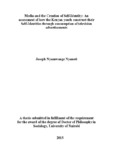| dc.description.abstract | This is a study of television advertisements as media texts and the Kenyan youth
Consumers of these advertisements from a cultural studies perspective. The study
Investigates the relationships between the meanings encoded by the advertising industry
And the meanings the youth decode from these advertisements to construct their self identities.
The study has three main objectives: (a) to deconstruct the
Ideological/mythical meanings embedded in Kenya television advertisements; (b) to
Investigate how the Kenyan youth perceive themselves; how they define their self identities;
And (c) to analyses how youth consumers decode meanings from what is
Encoded into television advertisements for their self-identity formation.
Available literature's suggest that television advertisements create meanings that resonate
With the target audiences. The advertisements project the lifestyles and tastes of the
Targeted demographics and psychographics of the audiences in order to create a
Familiarity towards the goods and services advertised. Empirical literatures show that
Consumption of television advertisements is much more than messages sent from the
Media houses to the audiences with predictive response, in the linear communication
Model. Audiences who consume television advertisements, on the contrary, engage these
Texts, where they are either convinced or they reject the messages of the advertisements.
They can also negotiate, taking in part of the message and rejecting the rest of it. This is
The main concern of this study, where the research sets out to investigate what meanings
Are circulated by the advertising industry and how the Kenyan youth engage these
Meanings to construct their self-identities. The study is conceptualized in the premise that
When the youth interact with media content, like television advertisements, they deploy
Their self-identities, already constructed from traditional socializing agents like family
And schooling. After this interaction they are able to redefine their self-identities, which
Are often reinforced by media interaction.
The study, therefore, employs a combination of semiotic analysis and focus group
Discussions to gather data on the ideological or hidden meanings in the advertisements
And the views of consumers of these advertisements. To ensure credibility of these
Qualitative data the researcher employs triangulation, where the researcher gathers
Quantitative data through a survey and key informant interview data from a creator of
Television advertisements.From the findings it is concluded that the Kenyan television advertisements are encoded
With meanings that resonate with the Kenyan youth, reflecting their tastes and lifestyles.
However, it is also concluded that the Kenyan television advertisements are replete with
Ideological or hidden meanings that reflect the gender, racial and class power imbalances
That are characteristic of the patriarchal capitalist society. Another conclusion is that the
Youth in Kenya, as television advertisement audiences, are unpredictable and therefore
Hard to classify demographically and psychographically. This makes them appreciate
Those advertising messages that resonate with their tastes and reject those that are
Dissonant with their ways of thinking. The thesis of this study, therefore, is that the
Kenyan youth know their way around television advertisements and are able to use them
For their social, effective and cognitive needs. From these conclusions the researcher
Makes three main recommendations: (a) there should be large-scale research to
Investigate the impact the various ideologies embedded in television advertisements have
On the Kenyan youth; (b) television advertisements make many claims, some of which
Are at variance to national cohesion and social change. Large-scale investigations should
Be conducted to interrogate these claims; and (c) cultural studies in general, and semiotics
In particular, should be mainstreamed in the department of sociology and social work of
The university of Nairobi in order to strengthen the study of mass communication from a
Sociological perspective. | en_US |

